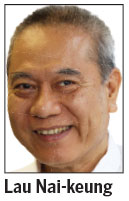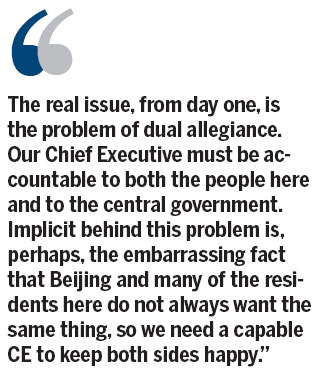Framework is crystal clear
Updated: 2013-11-26 06:40
By Lau Nai-keung(HK Edition)
|
|||||||
Li Fei, chairman of the Basic Law Committee (BLC) of the National People's Congress Standing Committee (NPCSC), and Zhang Rongshun, BLC vice-chairman, came last week for a three-day visit at the invitation of Chief Secretary for Administration Carrie Lam Cheng Yuet-ngor. If you want to know what the central government's stance is towards Hong Kong's pending political reform, you should listen to them as, besides their positions in the BLC, Li is also deputy secretary-general of the NPCSC and Zhang is vice-chairman of the NPCSC Legislative Affairs Commission. When it comes to constitutional matters, they are heavyweights.
The highlight of the visit was a luncheon attended by the city's political and business elite last Friday, where Li gave a keynote speech on universal suffrage in 2017. The speech, the text of which is available on the Internet, is by far the most comprehensive statement concerning this subject from Beijing but, unfortunately, some people in Hong Kong still refuse to listen.
The central government's repeated efforts to get its message through have been undermined not only by dissidents, but also by our government officials. After meeting Li, a senior official came out and told the press they didn't talk much about political reform and Li was not trying to set a "framework".
Since when does "framework" become a bad word? The very existence of the Hong Kong SAR is based on a framework - the Basic Law, as supplemented by other national and local legislation and the NPCSC's various interpretations. The reform of our political system, in turn, is subject to a dual framework - a local framework derives from local politics superimposed on the national framework based on the relevant laws and national interests.

Both of these frameworks are constantly evolving and they interact with one another. Among other things, the HKSAR government's performance influences local sentiments and local politics, in turn, influence the central government's sense of security. Contrary to popular belief, intervention by the central government was minimal before 2003. The disrespect towards Beijing's goodwill and the autonomy that it gave us creates a vicious circle that leads to the current state of affairs.
Given this co-evolution, it is essential that our public figures pass on to us Beijing's message accurately. Proper politics are done in the open; our politicians can't possibly think of sneaking a reform deal through questionable fine prints. Right now, they are either cheating or trying to avoid being the person who brings what they consider to be bad news.
Li's message is an elaboration of Beijing's overall stance, and he has made it much more concrete. The real issue, from day one, is the problem of dual allegiance. Our Chief Executive (CE) must be accountable to both the people here and to the central government. Implicit behind this problem is, perhaps, the embarrassing fact that Beijing and many of the residents here do not always want the same thing, so we need a capable CE to keep both sides happy.
On the one side of the equation, accountability towards Hongkongers is ensured by the mechanism of universal suffrage but, on the other side, the mechanism to ensure accountability towards the central government is less clear. As specified in the Basic Law, the right to appoint or not to appoint an elected CE is one of the key manifestations of the CE's accountability towards the central government, but that alone is not enough.

Pending political reform has to ensure accountability towards the central government in all the stages of nomination, election and appointment. Wang Guangya, director of the Hong Kong and Macao Affairs Office, first announced this clarification, and now Li Fei has made a very clear restatement - every eligible person is entitled to apply for a nomination, but through the "democratic process" prescribed by the Basic Law yet to be devised after public consultation there is no guarantee that he or she can be nominated to become a candidate. It is one of the responsibilities of the nominating committee to screen out unsuitable applicants, so that the risk of the central government having to exercise its right not to appoint will be minimized.
This is where the concept of the "patriot" comes into play. Under the current institutional setup, the identification of who is or is not a "patriot" has become the central government's only means to participate in the nomination stage indirectly and legitimately. This may not be a perfect solution, but it tackles the problem just fine.
Beijing has always made itself clear and tried to play a fair game. It's now our turn to formulate a serious response. Pretending that the framework does not exist is not an option.
The author is a member of the Commission on Strategic Development.
(HK Edition 11/26/2013 page9)